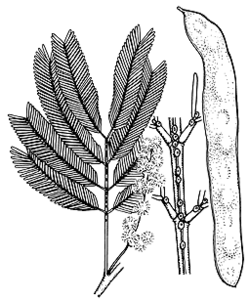Common name: a wattle
Acacia cangaiensis Tindale & Kodela APNI* Synonyms: Racosperma cangaiense (Tindale & Kodela) Pedley APNI*

Description: Shrub or small tree 2–6 m high; bark smooth or finely fissured, dark brown; branchlets terete, finely appressed-hairy.
Leaves with petiole 0.7–4 cm long, hairy, with 1 or rarely 2 small gland(s) in upper half and often 1 or rarely 2 similar glands at base of basal pinnae; rachis mostly 1–6 cm long, hairy, jugary glands present at most or all pairs of pinnae, 1–7 interjugary glands present between pairs of pinnae; pinnae usually 2–6 pairs, 1–8 cm long; pinnules 12–35 pairs, narrowly oblong to linear, mostly 5–15 mm long and 1–2.5 mm wide (ranges: 3–25 mm long and 0.6–3.5 mm wide), ± glabrous with margins appressed-hairy.
Inflorescences 7–25 in an axillary raceme with axis 4–13 cm long or in a panicle; peduncles 5–11 mm long, yellow-hairy; heads globose, 24–43-flowered, 5–7 mm diam., pale or bright yellow.
Pods straight to curved and often twisted, ± flat except convex and rough over seeds, 2–14 cm long, 9–12 mm wide, leathery, with minute, ± appressed hairs, glabrescent; seeds longitudinal; funicle expanded towards seed.
Flowering: January–March.
Distribution and occurrence: from Gibraltar Ra. National Park to Nymboida National Park, including Cangai State Forest; rare. Usually grows in dry sclerophyll forest in skeletal soils on rocky slopes.
NSW subdivisions: NC, NT
Similar to Acacia schinoides which is a glabrous plant and differs in the details of the leaf glands. The name refers to the Cangai State Forest in the Clarence Valley of New South Wales where the species was first collected.
Text by P.G. Kodela
Taxon concept: P.G. Kodela & G.J. Harden, Flora of NSW Vol. 2 (2002)
APNI* Provides a link to the Australian Plant Name Index (hosted by the Australian National Botanic Gardens) for comprehensive bibliographic data
***The AVH map option provides a detailed interactive Australia wide distribution map drawn from collections held by all major Australian herbaria participating in the Australian Virtual Herbarium project.
|


